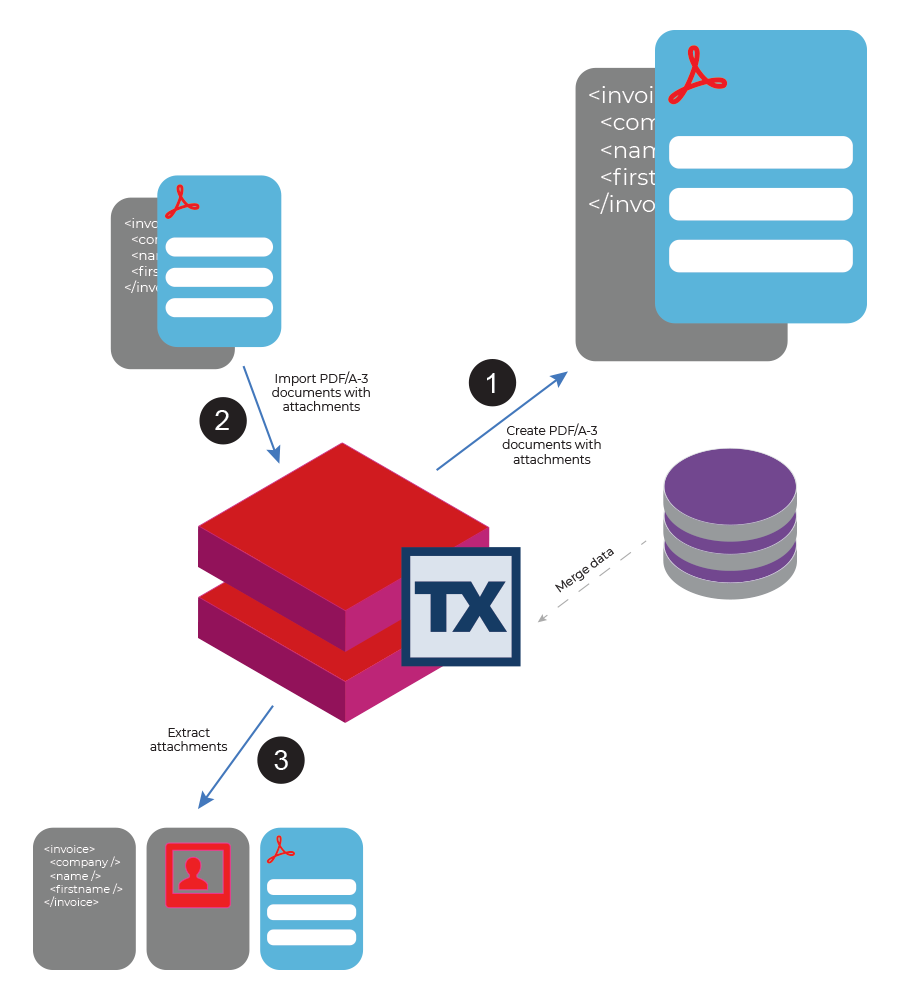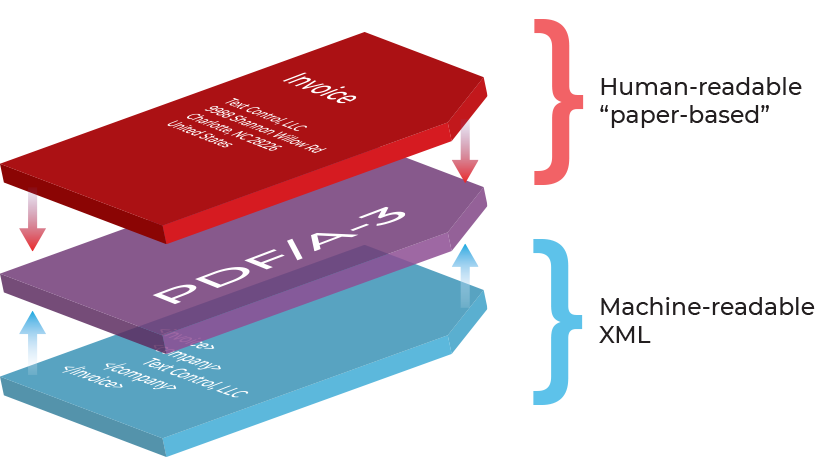Text Control Announces PDF/A-3 Support: The Future of Electronic Invoices
PDF/A-3 allows attachments in any format to be added to PDF documents. In case of the electronic invoice, a machine-readable XML part can be embedded. We are working on a general approach to embed and extract any document types to and from PDF documents.

ISO Standard PDF/A
The ISO standard format PDF/A prevailed since the introduction back in 2005. The idea is to provide a standard PDF profile that contains a number of rules and constraints to ensure that the document is 100% self-contained and can be uniquely reproduced.
Adding Attachments to PDF/A Documents
PDF/A-3 allows attachments in any format to be added to PDF documents. The standard itself doesn't standardize the embedded documents, but the way how they are embedded in the PDF structure. This enables applications to reliably extract the attached document from the PDF document which enables readers to extract only the embedded documents without having to open the complete PDF document itself.
The option to embed additional documents into standardized PDF documents was a highly requested feature from various industries including healthcare and government in order to attach additional, structured data to documents.
Workflow Covered by Text Control
We are currently working on a general approach to embed any type of document attachment to created PDF files. This allows developers to create PDF documents programmatically using the TX Text Control developer API and to embed any documents to these PDFs. In version X19 (29.0), TX Text Control will not only support the creation of these PDF documents, but also the import and extraction of attached documents.
The following diagram shows the supported workflows:
- The PDF/A-3 document is created using TX Text Control by merging data into an MS Word compatible template and by embedding attachments.
- A PDF/A-3 document (potentially created by a third party) is imported.
- The attachments can be extracted and stored and processed separately.

Electronic Invoices
In case of the electronic invoice, a machine-readable part can be embedded (such as XML). The processing application is not specialized in reading PDF documents, but is able to extract the structured attachment which is then processed by the commercial software that is able to read this attachment.
In many countries including Germany, there are regulations and new laws regarding electronic invoices. The tax simplification law (Steuervereinfachungsgesetz 2011) is equating the electronic invoice with the traditional, printed invoice. This law is based on an EU directive for invoice processing for public purchasing and government bids. This law should streamline business processes in order to make them more efficient.
Based on the directive, an electronic invoice must consist of the following required components:
- The receiver must consent to receive electronic invoices (or not opt-out).
- The invoice must be created, send, received and processed in an electronic format.
- The invoice must be readable by humans.
- The origin and authenticity needs to be provable.
- The invoice integrity must be guaranteed.
- Typical mandatory invoice details must exist (tax identification number, ...).
The ZUGFeRD Invoice
ZUGFeRD (Zentraler User Guide des Forums elektronische Rechnung Deutschland) is a specification for a format that describes electronic invoices. A ZUGFeRD invoice consists of two parts: The visual representation of an invoice that is readable by humans and machine-readable structured XML information which is attached to the PDF/A-3 document.

The advantage of such a document is that the embedded file can be easily processed by machines and the document itself can be visualized by any standard PDF reader and is therefore robustly archivable backed by the original PDF/A idea.
Conclusion
The powerful combination of paper-based PDF documents and machine-readable attachments enables data exchange and automated processing by the recipient without knowing anything about the visual representation of the document. At the same time, the visual layout and pixel-perfect representation is still required by law and important for the acceptance of electronic invoices. Even if electronically processed, invoices need to be controlled and checked by humans in case of mistakes and inconsistencies.
With TX Text Control, you get the tools to create, modify, and process PDF/A-3 documents in your business applications.
Jump to the other posts in this series:
- Text Control Announces PDF/A-3 Support: The Future of Electronic Invoices
- PDF/A-3: The Better Container for Electronic Documents
ASP.NET
Integrate document processing into your applications to create documents such as PDFs and MS Word documents, including client-side document editing, viewing, and electronic signatures.
- Angular
- Blazor
- React
- JavaScript
- ASP.NET MVC, ASP.NET Core, and WebForms
Related Posts
ASP.NETElectronic PaperHybrid Archiving
PDF/A-3: The Better Container for Electronic Documents
PDF is the most commonly used document format for business applications. This article gives an overview of the advantages of PDF/A-3 as an electronic container.
ASP.NETWindows FormsElectronic Invoice
X19 Sneak Peek: Validating ZUGFeRD / Factur-X Invoices with TX Text Control
ZUGFeRD / Factur-X documents can be created and extracted using TX Text Control X19. This article shows how to validate these eletronic invoices by matching invoice elements with the visual PDF…
PDF is Dead, Long Live PDF: Why PDF Remains Relevant in a Changing Digital World
Despite being on the market for more than 30 years, the Portable Document Format (PDF) remains a dominant force in industries such as legal, healthcare, and finance. This blog post addresses the…
Create PDF File with .NET C#
This article explains how to use the TX Text Control to create PDF documents in .NET applications, including ASP.NET Core and Windows applications. It covers setting up a console project in Visual…
Store Documents as PDF/A using C# - A Future-Proof Archiving Format
PDF/A is an international ISO standard for the preservation of electronic and digital documents. This article will explain the reasons and motivations and will show you how to create PDF/A…






